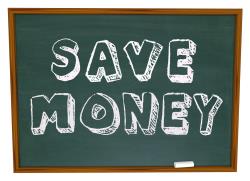Changing Your Spending Habits
Who likes being broke? The money seems to disappear before you even get a statement from the bank showing that your paycheck was actually deposited. Paying bills is a requirement of being a responsible adult, but that doesn’t mean any of us enjoy the process.
Your Financial Check-Up:
Living from paycheck to paycheck only magnifies the stress and worsens the situation. If something catastrophic were to happen, most of us would be financially destroyed within a couple months or less. However, feeling a sense of lack will only create more frustration, and although it’s a valid feeling, it doesn’t help the situation get any better.

Before your next pay period, identify the areas in your life which are still sucking up your cash flow. However inconsequential you feel your spending habits are, over time, it all adds up. Pinpoint these leaks and as a result, you will become more efficient at managing your money.
There are a number of things you can do to curb your spending which won't feel like you're sacrificing your lifestyle. It won't be easy, but you knew it wouldn't be. Think about where you could get a little bit of money. I realize at this point that you never valued $10 so much before in your life, but now you will!
Applying easy changes to your spending habits
Bring your lunch to work. If you were to eat your lunch out every day cheaply, say $5 each day on fast food, and you work on average 20 days in a month, you'd easily save $100 a month!
Drink water instead of soda. Vending machines vary, but figure $1.00 per soda and a cup of gourmet coffee at $1.50 per business day... 20($1.50 + $1.00) = $50 dollars a month! Think of the calories you will save yourself along with the added health benefit.
Curbing your monthly housing budget
- If you rent and have the option of moving to a less expensive apartment, do this as quickly as possible.
- If moving isn’t an option, rent out an extra room in your home to a roommate or relative. Obviously, this isn’t an ideal situation for the long-term. But remember, it’s only temporary. The additional money will make an enormous difference in your debt quest.
- If you can bring in a roommate, commit to a six-month arrangement. Imagine getting $300 or more per month plus half of the utilities subsidized. Over a six-month period, this will bring in over $1800, which can be directly sent to your target credit card. This may even be your alternative to having to get a second job.
The Real Cost Of Your Car
Do some common sense number crunching. If you have a five-year loan with an interest rate of 9% on an inexpensive $21,000 car, the interest drives the total cost to $30,450! That’s $9,450 of interest you paid! A good used vehicle could have been purchased for the cost of the interest alone.
In fact, for the amount of money you are spending on your car payment, you could practically afford a mortgage payment. You could buy at least four good used cars for $30,000. Honestly, unless you are a salesperson and are required to drive clients around, why would you throw your money away on such a purchase?
If you are committed to keeping your new car, promise yourself that you will drive it for at least 8-10 years before purchasing another vehicle. Ideally, you would purchase a used car outright. Let’s face it, you wouldn’t be having cash flow problems if you had $7000 or so sitting idle in a bank account.
Curbing Expenses
Here is a checklist of NON-essential items that you may be paying for regularly. If you are really hurting for day-to-day EXTRA CASH, consider eliminating some of these luxuries:
|
|
Consider what you spend annually on the above luxuries. For a short-term solution, try to minimize some of these non-essentials from your lifestyle. Do this at least until you’re feeling a sense of relief from the non-cash flow blues.
Identifying leaky holes (such as the luxuries above) and changing your spending habits will ultimately encourage cash flow. You’re probably not accustomed to thinking about squeezing the value from each dollar. I realize I’m making suggestions that may be cramping your style, but remember, it’s only temporary.
That’s the trick... Look at any habit you have and figure out annually how much it’s costing you. Even though there are thousands of money saving tips and tricks, mastering the basics is critical for success.
Article by Kimberly A. Griffiths, author of "One Paycheck at a Time"
For more ideas to take control of your spending habits, check out the following articles:
